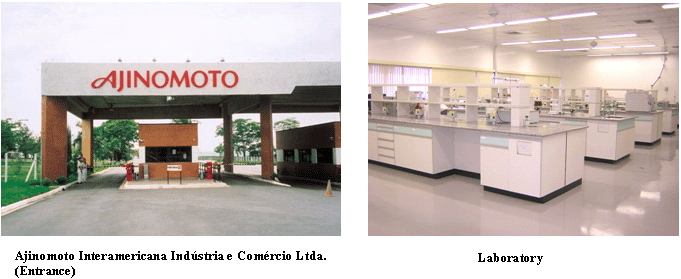

|
Ajinomoto to Produce Glutamine and BCAA at One of World’s Largest
Pharmaceutical- and Food-Use Amino Acid Plants in Brazil Annual Capacity to be Expanded by 4,000 Tons for Worldwide Supply |
|||||||||||||||||||||||||||||

February 3rd, 2005 - Tokyo - Ajinomoto Interamericana Indústria e Comércio Ltda. (President: Yoshihiko Sakai, Head Office: São Paulo State, Brazil) is currently constructing one of the world’s largest production facilities for amino acids for pharmaceuticals and foods (total investment: BRL 188 million/approximately JPY 6.6 billion) in Limeira, Brazil. The plant will initially produce four products: Glutamine* plus Valine, Leucine and Isoleucine, which are Branched Chain Amino Acids (BCAAs**). The company will begin full-scale production and sales of glutamine in the second half of 2005 and the three BCAAs one year later. At present, the total planned production capacity is 4,000 MT. In addition to domestic sales in Brazil, the company will export widely to North America, Europe, Asia, Japan and other regions. Glutamine and BCAAs were chosen as items for production at the new plant because worldwide demand for them has increased sharply in recent years for pharmaceutical and food applications. In addition to their conventional use as raw materials for infusions and medical foods, pharmaceutical- and food-use amino acids have found an increasing number of applications in strengthening immune functions, alleviating symptoms of nervous disorders, and in drug discovery research. The market for amino acids for beverages, health foods and supplements has also expanded in the last several years, and global demand has grown to about 17,000 tons. Glutamine and BCAAs have been highly evaluated as amino acids with particularly important activity in these growth markets, and various product development efforts are under way. The Ajinomoto Group, which holds a 60 percent share of the global market for amino acids for pharmaceuticals and foods, decided to increase production by constructing the new plant in addition to existing plants in order to meet the growing worldwide demand for these products. The Ajinomoto Group already has eight production bases for pharmaceutical and food-use amino acids around the world, and the new plant in Limeira will be the ninth. In conducting efficient, stable production of high-quality amino acids, the new plant will comply with pharmaceutical c-GMP for production management and U.S. Food and Drug Administration approval, as well as ISO 9001-2000 and ISO 14001. Reasons for the decision to build the new plant in Brazil include: 1) The Ajinomoto Group already has plants in Brazil producing AJI-NO-MOTO (monosodium glutamate) and feed-grade amino acids, with high-level production technology and highly experienced staff; 2) the proximity to raw sugar derived from sugar cane, the major raw material in fermentation; and 3) the location of the site adjacent to an existing Ajinomoto Group food products plant, facilitating the use of technologies and resources. The Ajinomoto Group is aiming to further develop its global business as the leading amino acids company. The Group will continue working to contribute to better health and quality of life of people worldwide by providing high-quality amino acids, related products and services. Glutamine* Glutamine, the most plentiful amino acid in the body, is a maintenance and energy source for the stomach and intestines, and also plays a role in maintaining and building muscle protein. It is important for maintaining and improving immune functions, promotes metabolism of alcohol and supports the working of the liver. As a result, glutamine is used in applications including anti-ulcer drugs, nutritional ingredients for patients, sports nutrition products, and as a nutrition source (growth medium) for cell culture. BCAA** BCAAs are included in the essential amino acids, and perform the most important functions in maintaining and building skeletal muscle. They are also used as an energy source for muscles during exercise, and reports suggest they may help alleviate fatigue. Because of these functions, BCAAs are widely used in nutritional agents such as infusions for patients before and after surgery, and are also being used increasingly in sports nutritional products. c-GMP*** : current-Good Manufacturing Practice

|
|||||||||||||||||||||||||||||